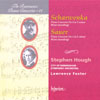The Romantic Piano Concerto - 11
View record and artist detailsRecord and Artist Details
Composer or Director: Emil von Sauer, (Franz) Xaver Scharwenka
Label: Hyperion
Magazine Review Date: 11/1995
Media Format: CD or Download
Media Runtime: 70
Mastering:
Stereo
DDD
Catalogue Number: CDA66790

Tracks:
| Composition | Artist Credit |
|---|---|
| Concerto for Piano and Orchestra No. 1 |
Emil von Sauer, Composer
City of Birmingham Symphony Orchestra Emil von Sauer, Composer Lawrence Foster, Conductor Stephen Hough, Piano |
| Concerto for Piano and Orchestra No. 4 |
(Franz) Xaver Scharwenka, Composer
(Franz) Xaver Scharwenka, Composer City of Birmingham Symphony Orchestra Lawrence Foster, Conductor Stephen Hough, Piano |
Author: Bryce Morrison
Here, surely, is the jewel in the crown in Hyperion's absorbing series, The Romantic Piano Concerto; a flawless marriage of composer, performance, recording and presentation. Scharwenka's Fourth Piano Concerto (his own particular favourite) is a far cry from his early, ubiquitous success, the E flat minor Polish Dance (''that fatal romp'' as he called it). Grand, Lisztian ambitions are fulfilled and embellished in writing of the most ferocious intricacy and the tarantella finale, in particular, throws everything at the pianist, seemingly simultaneously. It is therefore hardly surprising that after early triumphs the Fourth Concerto fell into neglect. At its second performance, given in 1910 with Scharwenka as soloist and Mahler as conductor, it was described as being of a ''truly Dionysian and bewildering brilliancy'', a phrase that, lifted into our own times, encapsulates Stephen Hough's astonishing performance. For here is a scintillating wit and ebullience that will make lesser technicians and stylists weep with envy. As magisterial as it is ear-tickling and affectionate, his playing glows with warmth in the third movement Lento and pulses with the most nonchalant glitter in the finale; one guaranteed to strike down less intrepid and fluent spirits with St Vitus's dance.
Then there is Sauer's First Concerto, its key a warm, over-the-shoulder memory of Chopin's E minor Concerto, yet with a style and content to make even the least susceptible listeners' heads nod and feet tap. The Cavatina is as luscious and enchanting as the finale is teasingly brief and light-hearted. Throughout, haunting melodies are embroidered with the finest pianistic tracery and, once again, the performance is bewitching. In the Cavatina Hough's caressing, fine-spun tone and long-breathed phrasing are a model for singers as well as pianists, and in the finale there is a lightly deployed virtuosity that epitomizes his aristocratic style.
Naturally, the spotlight falls unashamedly on the soloist in such music, but the orchestra have no small part in the proceedings, and Lawrence Foster and the City of Birmingham Symphony Orchestra are superbly resilient and enthusiastic, with strings that sing their hearts out, notably in the third movement of the Sauer. These are both premiere recordings, and the sound and balance are exemplary. But my final word must go to Stephen Heliotis who first offered these concertos to Hough for his delectation and unremitting toil, and whose accompanying notes deserve separate publication for their wit and perspicacity. A record, then, to rival and, indeed perhaps surpass Stephen Hough's early Gramophone Award-winning disc of Hummel concertos (Chandos, 6/87).'
Then there is Sauer's First Concerto, its key a warm, over-the-shoulder memory of Chopin's E minor Concerto, yet with a style and content to make even the least susceptible listeners' heads nod and feet tap. The Cavatina is as luscious and enchanting as the finale is teasingly brief and light-hearted. Throughout, haunting melodies are embroidered with the finest pianistic tracery and, once again, the performance is bewitching. In the Cavatina Hough's caressing, fine-spun tone and long-breathed phrasing are a model for singers as well as pianists, and in the finale there is a lightly deployed virtuosity that epitomizes his aristocratic style.
Naturally, the spotlight falls unashamedly on the soloist in such music, but the orchestra have no small part in the proceedings, and Lawrence Foster and the City of Birmingham Symphony Orchestra are superbly resilient and enthusiastic, with strings that sing their hearts out, notably in the third movement of the Sauer. These are both premiere recordings, and the sound and balance are exemplary. But my final word must go to Stephen Heliotis who first offered these concertos to Hough for his delectation and unremitting toil, and whose accompanying notes deserve separate publication for their wit and perspicacity. A record, then, to rival and, indeed perhaps surpass Stephen Hough's early Gramophone Award-winning disc of Hummel concertos (Chandos, 6/87).'
Discover the world's largest classical music catalogue with Presto Music.

Gramophone Digital Club
- Digital Edition
- Digital Archive
- Reviews Database
- Full website access
From £8.75 / month
Subscribe
Gramophone Full Club
- Print Edition
- Digital Edition
- Digital Archive
- Reviews Database
- Full website access
From £11.00 / month
Subscribe
If you are a library, university or other organisation that would be interested in an institutional subscription to Gramophone please click here for further information.




